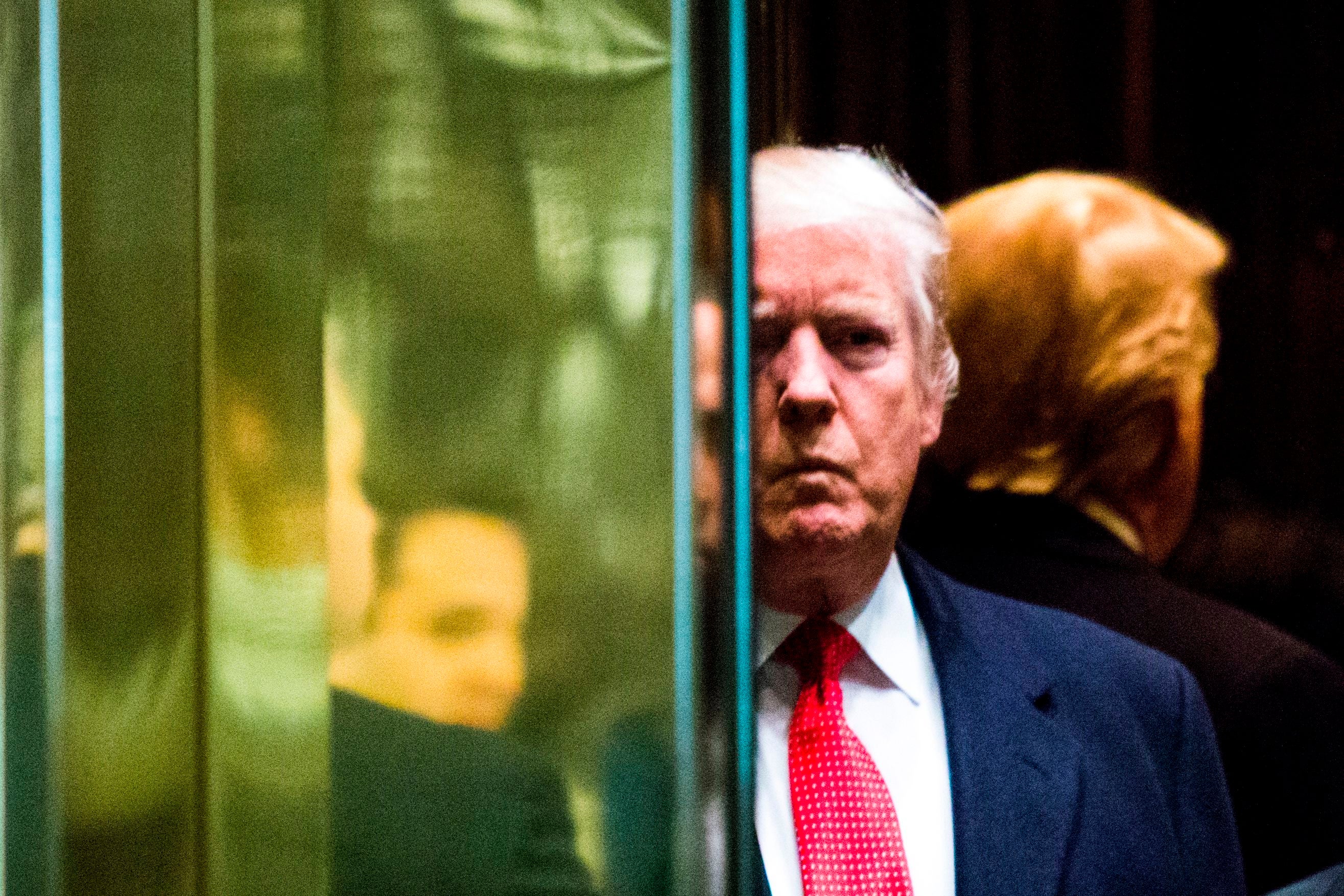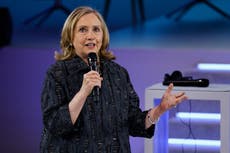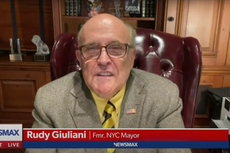Bigger than Watergate – or a Trump nothing-burger? What’s behind the latest GOP conspiracy theory
Experts say a court filing that has become fodder for Trumpworld’s endless series of accusations against Hillary Clinton raises serious ethical questions, writes Andrew Feinberg


Former president Donald Trump’s latest claim to have been spied on by someone directed by or associated with Hillary Clinton’s 2016 presidential campaign has found a welcome reception in conservative media, but experts say the former president’s basis for making such claims is as detached from reality as his previous attempts to cloak himself in a mantle of victimhood.
Banned from Twitter, the twice-impeached former president has since Saturday issued a succession of emailed statements reacting to a court filing from the office of John Durham, formerly the US Attorney for Connecticut, and currently a special counsel charged with the authority “to broadly examin[e] the government's collection of intelligence involving the Trump campaign's interactions with Russians” during the 2016 election.
In September, Mr Durham charged Daniel Sussmann, a lawyer who once worked for a firm representing the Clinton campaign, with making a false statement to the FBI while trying to tip agents off about an alleged computer connection between the Trump Organization and a Russian bank.
On Friday, Mr Durham’s office submitted a court filing asking a federal judge to direct Mr Sussmann’s lawyers to consider recusing themselves from his case. The filing contained a section asserting that the government “will establish” at Mr Sussmann’s trial that a “tech executive” he represented — an internet pioneer and malware expert called Rodney Joffe — had “exploited his access to non-public and/or proprietary Internet data,” specifically internet traffic from Domain Name System requests pertaining to a Michigan health insurance company connected to ex-education secretary Betsy DeVos’s family, two Trump-owned New York buildings, and the White House.
The next day, Mr Trump seized on the allegations — which had nothing to do with the subject of the filing — to proclaim that Mr Durham’s court filing contained “indisputable evidence that my campaign and presidency were spied on by operatives paid by the Hillary Clinton Campaign in an effort to develop a completely fabricated connection to Russia” and suggest that the alleged “crime” was “far greater in scope and magnitude than Watergate” and would have merited the death penalty “in a stronger period of time”.
On Sunday, he declared that his perceived enemies “spied on the president of the United States,” while that same day a Fox News headline blared: “Clinton campaign paid to ‘infiltrate’ Trump Tower, White House servers to link Trump to Russia,” with the latter claim coming from ex-Trump staffer Kash Patel, who suggested Mr Durham’s evidence showed that someone had “infiltrate[d]” White House servers.
He weighed in once more on Monday to connect Mr Durham’s allegations to his own false claim to have won the 2020 election, declaring: “I was proven right about the spying, and I will be proven right about 2020!”
It’s not the first time Mr Trump has made unfounded allegations of political espionage against prominent Democrats. In March 2017, the then-president claimed former President Barack Obama had his “wires tapped” at his eponymous New York skyscraper. Later that month, then-FBI Director James Comey told the House Intelligence Committee there was nothing to the claims.
Mr Trump also pounced on facts that emerged during prosecution of his former national security adviser, Michael Flynn, regarding the FBI becoming aware of Mr Flynn’s conversations with then-Russian ambassador to the US Sergei Kislyak through foreign intelligence intercepts of Mr Kislyak’s phone calls, and revelations that the FBI had obtained a foreign intelligence surveillance warrant against his erstwhile campaign manager, Paul Manafort, to claim that his allies were being unlawfully surveilled.
Mr Durham’s filing also provided fodder for a Fox News reporter to press White House Press Secretary Jen Psaki about the matter on Wednesday, asking at her daily press briefing whether “there's still a system picking up server data” from the Executive Office of the President.
The tale recounted by Mr Durham — a complicated spying operation conducted at the behest of a presidential candidate, stretching over a period of years — would make a compelling storyline if it were remotely true. But according to experts, it’s not.
One expert who debunked Mr Trump’s most recent complaint? His own ex-director of national intelligence.
John Ratcliffe, the former Texas congressman turned intelligence boss, told Fox News on Monday that it appeared Mr Joffe had had “lawful access” to the servers Mr Durham claims were exploited.
But a top information security expert — a Washington veteran who has worked for numerous high-profile political and non-political organizations and asked The Independent to describe him as a “local handyman” — said Mr Durham has no idea what he was talking about.
The expert said the description of how DNS data — essentially a directory assistance function that lets computers translate domain names such as independent.co.uk into numerical IP addresses — was obtained appeared to be deliberately written to stir up right-wing outrage but had little relationship to how the internet actually works.
There’s no need for anyone to directly access servers to view DNS lookups, he said, because anyone watching internet traffic could isolate them if they were in a position to monitor enough internet traffic.
He told The Independent the lack of technical accuracy in Mr Durham’s filing concerned him because a Department of Justice prosecutor would ordinarily have access to the best computer and security people in the world.
“The problem I have is that maybe they’re talking to Cyber Ninjas or some s*** like that,” he said, referring to the unqualified partisans who conducted the Arizona state senate’s sham audit of Maricopa County ballots last year.
He suggested that Mr Durham’s reason for bringing up the DNS data in the filing was twofold — to deliberately inflame right-wing media to prevent his investigation from being closed, and to help retroactively delegitimise the Mueller investigation into Mr Trump by casting any mentions of “Trump” and “Russia” as part of a fabricated “narrative”.
“The Republican Party playbook is to retcon and back engineer truth into their wildly crazy f***ing bulls***. And this is that — this is them back engineering truth,” he said. “I am much more willing to attribute it to malice than good work.”
Nick Akerman, a former federal prosecutor and an expert in computer crime law, also told The Independent that the way the computer-related allegations are presented in Mr Durham’s filing suggests he doesn’t understand the subject matter.
“He's an older guy. I'm sure he doesn't know this technology or understand it,” he said.
But Mr Akerman, who served as an assistant special prosecutor during Watergate, said the current special counsel is doing something far more sinister with his court filings which could put his office on the wrong side of important ethical lines: “It looks like he's using a conflict filing to float these very, very incendiary, worded accusations.”
The former federal prosecutor pointed out that had Mr Joffe or anyone else exceeded their lawful access to any data, they would be liable for criminal penalties under the US Computer Fraud and Abuse Act that would far exceed what Mr Sussmann faces for making false statements to the FBI. The fact that Mr Durham hasn’t charged anyone under the CFAA, he said, is a strong signal that no crime was committed and nothing untoward occurred.
“If you're granting access to non-public and proprietary data, that’s the Computer Fraud and Abuse Act … because it means they've exceeded their access, or they didn't have access to this material, and basically trespassed,” he explained. “If that's so how come [Mr Joffe] wasn't indicted? How come all these other people weren't indicted? Where are they?”
Continuing, Mr Akerman said the filing containing the accusations that Mr Trump and his allies have been crowing about was unnecessary because lawyers are duty-bound to explain potential conflicts of interest to their clients so the clients may affirmatively choose to waive the conflict so they don’t have to get a new lawyer.
“The entire point of the filing is those two paragraphs … it definitely deserves to be called out as bulls*** — I mean, it's just ridiculous,” he said.
Mr Akerman added that in his experience, the only reason Mr Durham or anyone working for him would be able to put such a document before a judge is because he is operating outside of the DOJ chain of command. Any other federal prosecutor whose name appeared on such an inflammatory filing would be looking for new employment before long, he explained.
“He's trying to dress it up as some kind of a conflict, but they have no right to tell these people who they should be represented by and who they shouldn’t be,” he said. “You can be fired if you're an assistant US attorney and you're putting stuff in this to defame somebody, and there's no real purpose to it”.
The criticisms of Mr Durham’s allegations regarding the DNS data and the way they were revealed in a seemingly unrelated court filing raise questions of whether he is running a legitimate investigation or assisting in what has become a long line of GOP attempts to smear political opponents, coming after Trump campaign attacks on President Joe Biden’s son Hunter Biden and Mr Trump’s frequent claims of a “deep state” conspiracy against his presidency.
In October 2020, Mr Barr named Mr Durham as a special counsel — protecting him from being fired and placing him outside the Justice Department’s normal chain of command and making his meta-investigation something of a bizarro answer to ex-FBI director Robert Mueller’s probe into the 2016 Trump campaign.
The Independent has reached out to the Justice Department for comment on the propriety of Mr Durham’s court filings.
One person who has been on the receiving end of Mr Trump’s seemingly endless stream of information, former Secretary of State and 2016 Democratic presidential nominee Hillary Clinton, offered an answer to those questions in a tweet on Wednesday.
“Trump & Fox are desperately spinning up a fake scandal to distract from his real ones. So it's a day that ends in Y,” she wrote. “The more his misdeeds are exposed, the more they lie”.



Join our commenting forum
Join thought-provoking conversations, follow other Independent readers and see their replies
Comments